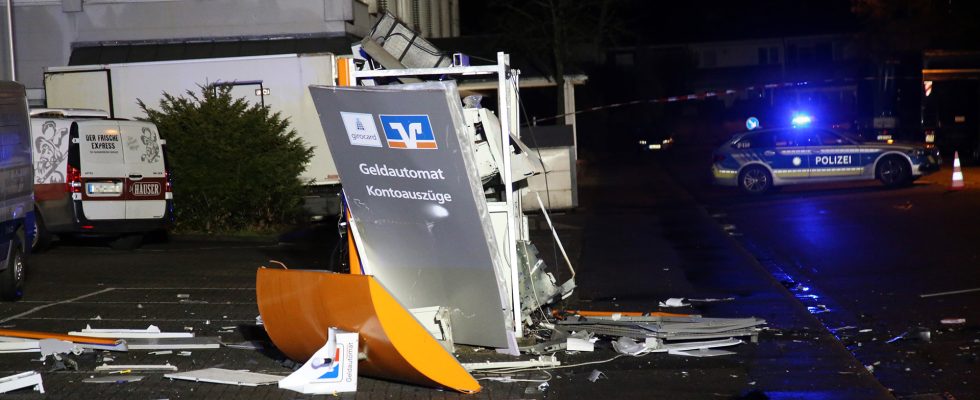Status: 04/20/2023 11:33 a.m
Again and again, criminals blow up ATMs. If the deeds are successful, the average loot is more than 100,000 euros. Banks, authorities and insurance companies are arguing about what to do.
It regularly hits ATMs in the country, which are not far from the motorway. Hardly anyone is out and about in villages at night. Anyone tampering with the devices is not noticed. The nearest police station is often far away. The deeds are quick: set explosives, look for cover, detonate and quickly collect the money. The perpetrators jump into previously stolen fast cars and sprint away.
A year ago, the Federal Ministry of the Interior published figures in response to a parliamentary inquiry. According to this, a third to a half of the blasts are successful for the perpetrators. Their booty averages more than 100,000 euros.
Little interest in protecting the machines?
It is often said that banks have little interest in expensive protection for their ATMs. damage is insured. However, insurance premiums depend on the risk. The General Association of the Insurance Industry points out that the location, security level and capacity of ATMs are calculated precisely by insurance companies. But the insurers are not satisfied with their customers. Association spokesman Christian Ponzel says so Hessian radiothat the measures taken by the banks “apparently are still not sufficient”.
The police initially have an eye on the dangers that emanate from uncontrolled explosions, but also from risky driving behavior by perpetrators on the run. What is difficult is that when there are detonations, police officers come from distant stations. You can therefore do little to counter the fast offenders. Four weeks ago, federal and state police held a three-day manhunt against perpetrators who blow up ATMs. Thousands of checks revealed 180 crimes. Nothing is reported about successes with ATM perpetrators – even when asked.
Politics increases the pressure
The Federal Ministry of the Interior, which is responsible for the Federal Police, is putting pressure on them. At the end of last year, Interior Minister Nancy Faeser called a “round table on ATM blasts”. Participants from the banking industry, insurance industry and authorities agreed on new security devices in a joint declaration.
In the long run, things should not be as free of domination and equal rights as is usual at round tables. “In the event that the joint declaration is not sufficiently implemented and the crime situation does not demonstrably improve to the required extent, the Federal Ministry of the Interior will immediately and vigorously support the legal obligations of ATM operators,” said a spokeswoman for the interior minister Hessian radio.
The merger of the banking associations “Deutsche Kreditwirtschaft” countered: “From our point of view, a legal regulation is the wrong approach and does not do justice to the fundamental distribution of tasks in our state community”.
The perpetrators focus on small, rural branches
Volksbanks and savings banks are mostly affected. According to an industry association, constant criticism of the security measures taken by local banks is unfair: “We are the victims, not the perpetrators”. In contrast to commercial banks, Volksbanks and savings banks still operate many ATMs in rural areas.
The Bundesbank is dependent on local banks for its statutory task of supplying the population with cash. At Faeser’s “Round Table” the then Bundesbank board member Johannes Beermann expressly pointed out the great importance of ATMs for supplying cash. It is clear that it will be more difficult for savings banks and Volksbanks if they are generally forced to be more secure. They advocate tailor-made security for every single ATM.
There are discussions about locking the rooms in which the machines are located at night. Better video surveillance and security technology – such as fog machines in the event of burglaries – are expensive. ATMs, which already cost around 30,000 euros, can also be built to be mechanically more stable, but this could provoke stronger explosive charges.
Glue traps are also discussed: if a vending machine is blown up, quick-hardening glue flows over the money. The Bundesbank approved the procedure four weeks ago. It comes into play when damaged banks want to exchange a lump of paper bills. Occupational health and safety is still unclear. Adhesive and color cartridges must not evaporate poisons and must be safe in the event of maintenance errors.
Many perpetrators come from the Netherlands
“In the Netherlands, we have already observed that increased preventive measures have resulted in crimes being pushed out to other places, including Germany,” says Interior Minister Faeser. This effect is controversial. Much less cash is used in the Netherlands. There are far fewer ATMs, especially in rural areas. Because of the lower everyday need, they are filled with significantly fewer notes.
Most of the known bombers recently came from the Netherlands. The answer to a small query from AfD members of the Bundestag showed that in 2020, 111 of the 168 suspects identified came from the Netherlands. A situation report by the Federal Criminal Police Office states: “These are mainly people from the Utrecht/Amsterdam region, who often have a Moroccan migration background.”
Bank security experts and criminal investigators consider it likely that liaison officers in Germany will scout bank branches and escape routes. Another argument in favor of an organization in Germany is that the perpetrators flee on foot and quickly disappear when they cause accidents on their often breakneck escapes or are harassed by pursuers.

